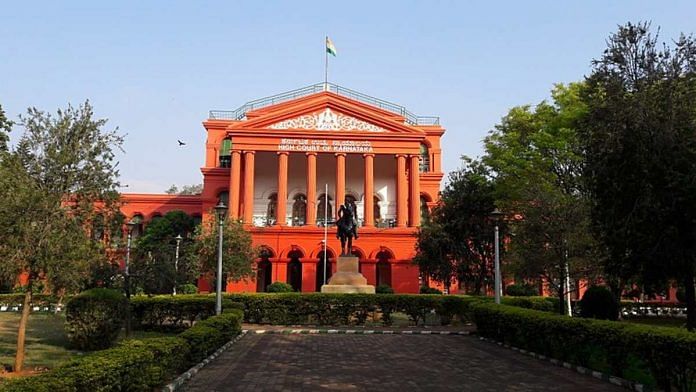New Delhi: Government Pre-University College, Udupi, as well as its college development committee (CDC) Wednesday asserted before the Karnataka High Court the institution’s right to prescribe a uniform and restrict usage of “religious symbols” on the campus to maintain secular order and foster uniformity.
The college management and the CDC further claimed that rules regarding uniforms for girl students were prescribed for the first time in 2004 and the hijab was never a part of them.
Multiple amendments were made to the rules, they said, but at no point of time were they ever challenged till last December, when protests broke out over hijab restrictions.
They also accused the “radical organisation” Campus Front of India (CFI) of organising the protests.
The submissions were made before a three-judge bench of the Karnataka High Court — comprising Chief Justice Ritu Raj Awasthi and justices Krishna Dixit and J.M. Khazi — which is holding a day-to-day hearing on petitions questioning the regulation of hijab in the Udupi college.
The petitioners have also challenged the state government’s 5 February order, which, they contend, obliquely supports the hijab ban.
The BJP-led state government Tuesday concluded its arguments before the HC bench, and maintained that the hijab is not an “essential religious practice” to Islam and that institutions are entitled to exercise their discretion over enforcing compliance to uniforms or dress codes.
Also read: Karnataka HC must determine if hijab is an essential practice in Islamic law, says state govt
‘The uniform is to ensure equality in education’
Taking forward the arguments from where the state left, the college blamed what it called a “radical organisation” for instigating the students to agitate. The CFI — student wing of the Islamic organisation Popular Front of India (PFI) — was accused of escalating the hijab row.
Uniforms are meant to remove discrimination among students, but if a handful of students are allowed to wear the hijab, then those who don’t wear religious clothing would be regarded “areligious” within a community, the college and the CDC said. This, they added, would run counter to the concept of “public order”.
Even assuming hijab is an essential religious practice, it has to yield to a public institution, which has every right to make sure no religion is allowed inside the school, senior advocate Sajan Poovayya told the bench on behalf of the CDC.
Since the Karnataka Education Act advocates a secular outlook in educational institutions, it is incumbent upon the college to make sure the law’s objective is followed, Poovayya said.
“Hence, the uniform is to ensure equality in education. It does not matter whether you are a Hindu or Kodava, Christian or Muslim, Shia or Sunni. The dress is uniform. When I prescribe a uniform as an institution, religion is immaterial to me,” he said.
Poovayya rejected the petitioners’ submission that the CDC was a politically aligned body, and urged the court not to entertain such an argument, since the constitution of the body was not in doubt before it.
Allowing the hijab in educational institutions will amount to discrimination between practising Muslims, non-practising Muslims and non-believers, he told the bench.
“The basic constitutional value as a school is to impart secular education and to protect the dignity of a girl child. Why is it that we teach our girl child to dress modestly and not boys?” Poovayya argued.
If a student wishes to wear the hijab, she has the option to seek admission in a college where rules allow it, he further said.
Poovayya said the controversy over hijab has surfaced at a time when other states such as Kerala have brought gender neutrality in their uniforms to maintain a secular outlook in the precincts of the school.
‘Authority of the school cannot be belittled’
Earlier, senior advocate S.S. Naganand advanced submissions on behalf of the college management, its principal and a teacher, and remarked that religious freedom cannot abridge other people’s freedom of expression and can be restricted if it affects somebody else’s fundamental right.
He showed the Aadhaar cards of two petitioners, also college students, to point out that the girls were not always in the hijab.
In the photographs affixed on their Aadhaar cards, they were not wearing the headscarves.
This, the lawyer added, proves that the students are not professing any “faith in the sense that they always wear a hijab in public”.
Naganand denied allegations that the college principal or teachers had threatened the students if they wore the hijab. Rather, the students were rash, rough and refused to attend classes when they were told take off their hijabs in the classrooms, he said.
In support of the CDC’s regulation on the uniform, he added that the committee is a democratic body that took a decision to maintain public order and good relationship.
“There is an element of discipline in an institution. Authority of the school cannot be belittled,” he said.
Judgments from the European court of Human Rights were placed before the bench to underline the interpretation given by foreign jurisdictions on “freedom of religion”.
It was argued that while the United States and Australia allowed unrestricted freedom in this context, other countries, including India, did not.
(Edited by Saikat Niyogi)
Also read: A timeline of how hijab row took centre stage in Karnataka politics and reached HC






